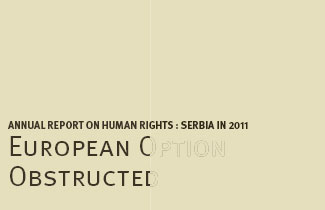 |
The
Helsinki Committee for Human Rights publicized its twelfth in a row
annual report that scrutinizes the situation of human rights against
the overall political and socioeconomic backdrop in the past year.
Despite considerable reformist and administrative
achievements in 2011 - above all the record-breaking and
government-sponsored number of EU-tailored laws - Serbia's political
and economic system was not fundamentally transformed, rational
thinking about the country's position did not take place and a new
value system preconditioning the respect for human rights was not
even outlined. The report for the year 2011 is published under the
title "European Option Obstructed". |
"Apart from the reform of the army and, to a certain extent, of the
police, a large-scale judicial reform - much disputed from the very
start - took place. However, actual effects of these reformist moves
were minimal. "European" laws were not implemented, corruption was
not abated and independent regulatory agencies were under constant
pressure from the executive branch. When the European Council
postponed Serbia's candidacy problematic policies other than the
crucial one (normalization of relations with Kosovo) were more
openly discussed in public. This primarily refers to the faulty
reform of the judiciary and the functioning of the High Judiciary
Council."
These are some quotes of the introductory section
titled "No Potential for a Leap Towards Europe". The
introduction points out among other things:
Having opted for a "partition scenario" as a
settlement of the Kosovo issue, the government neglected crucial
problems plaguing the country: declining economy, reforms and
regional relations. The country stagnated. The stagnation negatively
affected the respect for human rights and implementation of human
rights legislation. Moreover, radicalized rhetoric and radicalized
public sphere impaired the overall social and political climate that
preconditions minorities' inclusion. A gap between the majority
nation and minorities grew deeper. Governmental policy was obviously
inadequate for the promotion of interethnic tolerance and
coexistence."
Apart from recommendations to the Serbian
government, the civil society and the international community, the
introductory section includes headlines such as "Serbia's Right
Wing: The Ideology of Ethnic Homogenization," "Transitional Justice:
In the Service of Suppressed Accountability" and "State and Civil
Sector: Denied Partnership." On over 600 pages the Committee's 2011
report broaches topics grouped in the following chapters:
"Judiciary",
"People's Assembly of the Republic of Serbia", "Apparatus
of Power", "Independent Regulatory Agencies",
"Minorities",
"Religious Communities", "Socioeconomic Frame",
"Discrimination",
"The Prison System", "The Media", "Decentralization
and Regions", "Serbia and Neighboring Countries" and
"Serbia and the World".
The 2011 annual report, circulated in Serbian and
English, was published with the support from Civil Rights Defenders
and Royal Norwegian Embassy. The publication in English will be soon
available for downloading at www.helsinki.org.rs along with
hard copies to be obtained in the Committee's offices.
Belgrade, June 20, 2012
Acrobat PDF (4.69mb) >>> |
